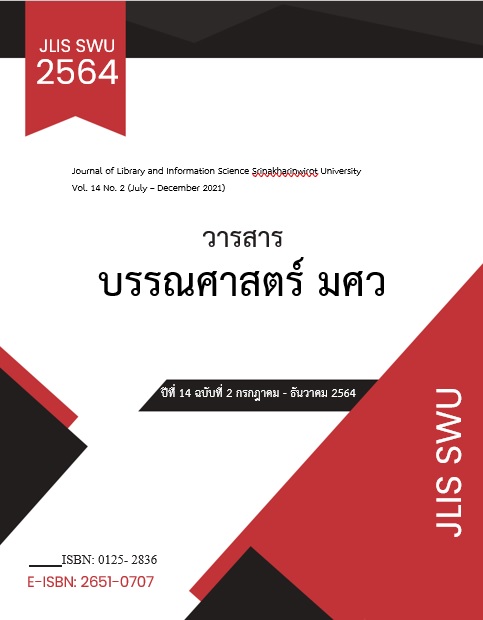Social Media Usage Behaviors of Undergraduate Students, Srinakharinwirot University
Keywords:
Social Media Usage Behaviors, Undergraduate Students, Srinakharinwirot UniversityAbstract
The objective of this research 1. to study the use of social media among 2. Undergraduate Students, Srinakharinwirot and to study the impact of social media use of undergraduate students at Srinakharinwirot University. The sample group was 394 students of Srinakharinwirot University in the academic year 2020. The statistics used were frequency, percentage, mean and standard deviation. The results of the research showed that most of the students had 5 to 10 years of experience using social media, the behavior of using social media more than 1 time per day, the average duration was 3 hours or more. It is popular to use social media from 6:00 PM to 9:00 PM. The most accessible places are houses / dormitories. Devices for accessing social media are mobile/smart phones. The most used social media is Instagram. Purpose used by social media is for entertainment. Opinion on the impact of the students' use of social media;
- In learning; social media are useful for researching and learning to make their studies easier.
- The family aspect; social media makes it possible to communicate with each other without distance restrictions.
- Emotional aspects; It feels good when doing something positive and influencing people on social media.
- Social aspects; social media makes it easier for you to contact your friends.
References
Alexander, B. (2008). Social Networking in Higher Education. Retrieved from
https://www.educause.edu/research-and-publications/books/tower-and-cloud/social- networking- higher-education
Awadallah.(2014). Social Network: Academic and Social Impact on College Students.ASEE 2014 Zone I Conference, April 3-5, 2014, University of Bridgeport, Bridgpeort, CT, USA.Sandra C. Duhe
Barbour, M. K. & Plough, C. (2009). Social networking in cyberschooling: Helping to make online
learning less isolating. Tech Trends, 53(4), 56-60.
Bunchom Sisaat. (2013). Preliminary research. Edition 7. Bangkok: Suwiriyasan. (In Thai)
Chutharat Sarawanawong, khachon Faithet, Duangkaeo Ngoenphunsap & Wanlapha Chantharadi, (2017, July- December). Online Social Media Usage Behaviors of Undergraduate Student, Kasetsart University,
Library and Information Sciences Srinakharinwirot University, 10(2). 16-31. (In Thai)
Camilia, O.N., Ibrahim, S. D., and Dalhatu B. L. (2013). The Effect of Social Networking
Sites Usage on the Studies of Nigerian Students. The International Journal Of Engineering And Science, 2(7), 39-46.
Fueangfa Hirankan. (2013). BEHAVIOR OF Used Social Network in Secondary Senior High School At The Secondary Education Service Area Office 11 In Suratthanee (Master’s thesis). Walailak University, Nakhonsithammarat,
Thailand. (In Thai)
Hathairat Losi & Wichian Manlae. (2018). Behavior of using online social sales network of students at Nakhon Si Thammarat Rajabhat University. Retrieved from http://wjst.wu.ac.th/index.php/wuresearch/article/view/5315. (In Thai)
Kanphon Phasi. (2011). Online Social Network in Thai Higher Education: A Study of Facebook Integrated Classroom Activities. Faculty of Hospitality Industry, DTC : Bangkok. (In Thai)
Ministry of Digital Economy and Society, Electronic Transactions Development Agency. (2019).
Report The results of the survey of internet user behavior in Thailand, 2018. Retrieved from
https://www.etda.or.th/publishing-detail/thailand-internet-user-profile-2018.html. (In Thai)
Mohamed Tayseer, Fouad Zoghieb, Ismail Alcheikh and Mohammad N.S.
Namthip Wiphawin. (2015, July-December). Social Network in a Networked Society. TLA Research J, 8(2).
119-127. (In Thai)
Narit Phongson. (2017). Self-Identification of facebook users belonging to generation c in bangkok
(Master’s thesis). Bangkok University, Bangkok, Thailand. (In Thai)
Phanuwat kongrat. (2011). The Study of Teenagers' Behaviors in Using Social Networking
Sites (SNSs) in Thailand: A Case Study of Face. (Master’s thesis). Thammasat University,
Bangkok, Thailand. (In Thai)
Phatcharaphon kraichumphon. (2012). Attitudes and Behavior through Social Networks in Establishing A Reputation : Case Study of Youtube. JC E-Journal, 1-11. (In Thai)
Phenphon Phuangphae (2016, May- August). A Study of behavior for using of Social Media of preservice teachers, Faculty of Education, Silpakorn University. Veridian E-Journal, Silpakorn University. 9(2), 946-956.
Rewadi Senkaeo & Ketawa, Bunprakan. (2011, January-June). Ettects of Chatting on the Internet in Adolescences
in Nakhon Yala Municipality. Journal of Liberal Arts, 3(1), 105-121.
Sippakara Khiaosanthia. (2018). Emotional Victim in Social Media (Master’s thesis). Silpakorn University,
Bangkok, Thailand. (In Thai)
Suchalaksa Thamduangsi. (2019). Social Network Usage Behaviors of Rajabhat Maha Sarakham University’s Students. Rajabhat Maha Sarakham University: Mahasarakham.
Williamson, Andy. (2013). Social Media Guidelines for Parliaments. Retrieved from
http://archive.ipu.org/PDF/publications/SMG2013EN.pdf
Additional Files
Published
Issue
Section
License
Copyright Notice
Copyright of articles in the journal of Journal of Library and Information Science Srinakharinwirot University is the author's and the Faculty of Humanities, Srinakharinwirot University. All articles submitted for publication will be assessed by a group of distinguished reviewers. The Faculty of Humanities, Srinakharinwirot University and the editorial board claim no responsibility for the contents or views expressed by the authors of Individual articles. Copying is allowed freely, provided acknowledgement is made thereof, and within the scope of copyright law.



